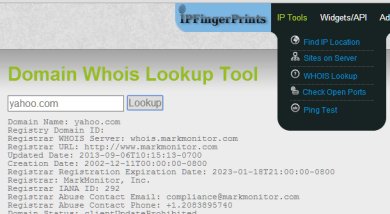If you have a router providing your internet connectivity, it probably has a built-in firewall. Windows too, of course, has its own firewall. Between them, they ensure that a hacker who tries to connect to your computer via the internet won't be able to get in. The firewall will simply discard their request, or even pretend that your computer simply isn't there.
But how can you test that your firewall is working? The answer is to perform a port scan. This means that you need to persuade another computer on the internet, outside of your own home or office network, to try connecting to your IP address on all the common ports (or channels). The simplest way to do this is to employ the services of a free web-based port scan too, and one of the simplest ones can be found at www.ipfingerprints.com. Select the Check Open Ports from the menu on their page, and then enter the IP address of your router (assuming the system hasn't already worked it out and typed it in for you).
Next you'll need to select a range of ports. From 1 to 1024 should suffice. Ignore the warning that the range is too big - it should be fine.
After 20 seconds or so, you'll see the list of ports which appear open and which your firewall is not blocking. Unless there's any reason to have them open, such as because you're running a game server, they should all be closed. If not, time to start investigating why, because you don't want any open links from the internet into your PC without good reason.
In addition to the port scan facility, www.ipfingerprints.com offers some other useful tools. It'll show you a map of where an IP address is based, and will also show you lots of information about any domain name you care to type in.

 We are looking for people with skills or interest in the following areas:
We are looking for people with skills or interest in the following areas:

Comments
Thank you Rob. There is no harm in letting the community know about an additional "new" tool, and in the end each of us (users) are responsible for selecting and using whatever we wish to use. The moderators of this forum do good work, and we all benefit from the information.
Point 1: "Locate an Internet Address" is more snake oil than science -- regardless of whoever is promising it. So much of this so-called locational identification depends on who your ISP happens to be. Mine is BT. My ISP geographical address is consistently given by EVERY ISP address finder I've yet encountered as a suburb of Newcastle upon Tyne. Yet I actually live 64 miles from there. What on earth is the point of any "geographical locator" if it has a plus or minus tolerance of 64 miles??? Or, to put it another way: what's the point in *seemingly* discovering that someone lives just south of Northampton. . . when they actually live in central London???
Point 2. I've been using Steve Gibson's website since the days of the collapsing Iomega Zip Drives -- oops, shouldn't say that, should I? Iomega did everything it could to stifle the news -- and stifle Steve Gibson, too. . .
Thanks for the heads-up, techsupportalert, but as ca1n has said here, it would've been nice to mention Steve Gibson in an article of this type: the techsupportalert heads-up is appreciated -- but could not it have been said that what it relates to is a welcome addition to an *existing* body of knowledge. . ???
Thank you for another excellent heads-up! Appreciate.
Nice site, it's a bit slow, possibly because of this article ;)
An alternative (with lots of other fun stuff) can be found at the Gibson Research Corporation https://www.grc.com/x/ne.dll?bh0bkyd2 It does pretty graphics too.
:D BURN!
...no seriously, it shouldn't have needed to be pointed out. GRC has only been a trusted, excellent resource since the 90's!
I wish people would stop creating inferior (or duplicate) things that already exist. Put your energy into something else. It's getting really hard to wade through the ocean of information already, time to trim the fat.
Fair point, I guess my comment was a little premature. After looking into it a bit more, I can see that this does have its value.
Thanks for sharing rob